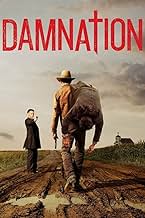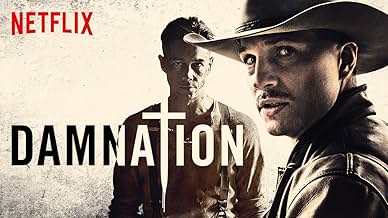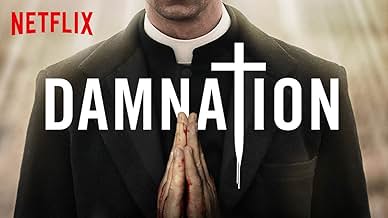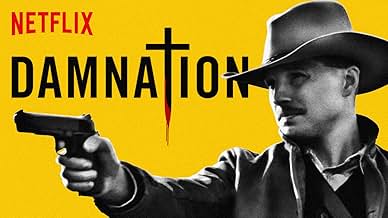AVALIAÇÃO DA IMDb
7,6/10
9,1 mil
SUA AVALIAÇÃO
Uma saga épica sobre a história secreta do coração dos Estados Unidos nos anos 30, enfocando o conflito mítico e a luta sangrenta entre o dinheiro e os oprimidos.Uma saga épica sobre a história secreta do coração dos Estados Unidos nos anos 30, enfocando o conflito mítico e a luta sangrenta entre o dinheiro e os oprimidos.Uma saga épica sobre a história secreta do coração dos Estados Unidos nos anos 30, enfocando o conflito mítico e a luta sangrenta entre o dinheiro e os oprimidos.
- Prêmios
- 1 vitória e 5 indicações no total
Explorar episódios
Enredo
Você sabia?
- CuriosidadesWas originally titled "Dark Wind," but was changed to "Damnation" to fit the show's theme and tone.
Avaliação em destaque
If you liked "Deadwood" you might like "Damnation." Both "Damnation" and "Deadwood" are about power politics and corruption in western settings, "Deadwood" being set in the 19th Century Gilded Age in South Dakota, "Damnation" set in rural Iowa during the Great Depression (1931). FYI, the writers and director of "Damnation" have worked on projects like "Longmire" and "Office Space." The writing is well done (if brutal), and the acting excellent. Filmed in Calgary, Alberta, the scenery passes well enough for some parts of Iowa.
One of the differences between the two series is that "Damnation" is, while set in the past, deliberately intends to comment on our current state of affairs in the early 21st Century. The 1930's, like our time now, was a time when the economy failed millions, institutions such as the press, law enforcement and the courts appeared to have been corrupted, and the answers to these problems seemed they could only be solved by revolutions either by the extreme right or the extreme left. The comparisons can be taken a little far: one character, representing the "Big Business" interests coming after the small farmers, reveals that the interests he represents wants to eventually kick the farmers off their land to not only mechanize agriculture, but also mechanize factories and warfare (I think with our fears of Artificial Intelligence, this is more a fear of our time than the 1930's).
Another difference between "Deadwood" and "Damnation" is that the ruthless business interests are actively being opposed. The farmers are attempting to unionize and strike to protect themselves (though two of the main characters, who are the main labor organizers, would likely really prefer a workers revolution). Also, media like the investigative press and radio may also end up playing part in opposing "Big Business" and their enforcers. So far however, the local paper in "Damnation" is covering up the attempt to drive the small farmers off their land by price fixing and violence by strikebreakers.
The USA Network provides excellent video interviews with the director and writers, who make clear this is their intent. "To understand the present, go back to the past," one of the writers says, or that the series, while set in the 1930's "Mirrors the Past (director Adam Kane)." USA also provides a couple of good mini-documentaries "Legacy of the Heartland: The One Thousand" and "Legacy of the Heartland: War of Words." The documentaries and the interviews put the characters and the action in better context, and really make this interesting, well thought out series more understandable.
One of the differences between the two series is that "Damnation" is, while set in the past, deliberately intends to comment on our current state of affairs in the early 21st Century. The 1930's, like our time now, was a time when the economy failed millions, institutions such as the press, law enforcement and the courts appeared to have been corrupted, and the answers to these problems seemed they could only be solved by revolutions either by the extreme right or the extreme left. The comparisons can be taken a little far: one character, representing the "Big Business" interests coming after the small farmers, reveals that the interests he represents wants to eventually kick the farmers off their land to not only mechanize agriculture, but also mechanize factories and warfare (I think with our fears of Artificial Intelligence, this is more a fear of our time than the 1930's).
Another difference between "Deadwood" and "Damnation" is that the ruthless business interests are actively being opposed. The farmers are attempting to unionize and strike to protect themselves (though two of the main characters, who are the main labor organizers, would likely really prefer a workers revolution). Also, media like the investigative press and radio may also end up playing part in opposing "Big Business" and their enforcers. So far however, the local paper in "Damnation" is covering up the attempt to drive the small farmers off their land by price fixing and violence by strikebreakers.
The USA Network provides excellent video interviews with the director and writers, who make clear this is their intent. "To understand the present, go back to the past," one of the writers says, or that the series, while set in the 1930's "Mirrors the Past (director Adam Kane)." USA also provides a couple of good mini-documentaries "Legacy of the Heartland: The One Thousand" and "Legacy of the Heartland: War of Words." The documentaries and the interviews put the characters and the action in better context, and really make this interesting, well thought out series more understandable.
- davidtalburtt
- 21 de nov. de 2017
- Link permanente
Principais escolhas
Faça login para avaliar e ver a lista de recomendações personalizadas
- How many seasons does Damnation have?Fornecido pela Alexa
Detalhes
- Data de lançamento
- País de origem
- Central de atendimento oficial
- Idioma
- Também conhecido como
- 毀滅之境
- Locações de filme
- Empresa de produção
- Consulte mais créditos da empresa na IMDbPro
Contribua para esta página
Sugerir uma alteração ou adicionar conteúdo ausente









































